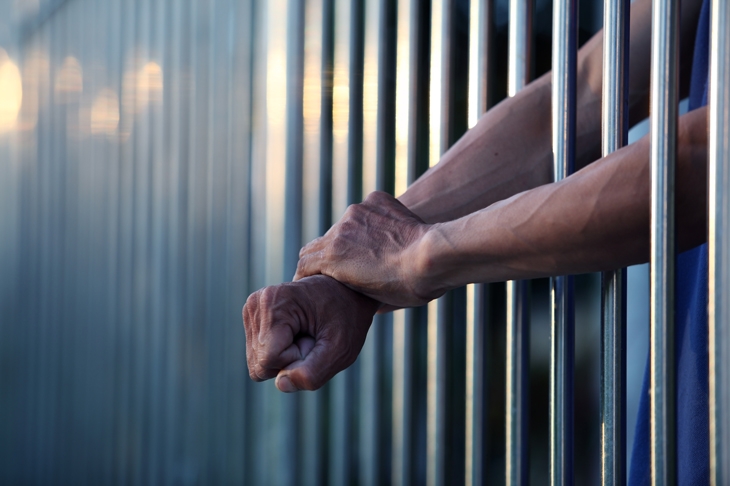My first sight of Colin was as a lanky manifestation lying on a desk in the Dartmoor prison education department where I was working as the writer-in-residence. He looked a bit like Ian Curtis; he was mid-twenties, clever and funny. He was also on an IPP — imprisonment for public protection sentence — for GBH, and because IPPs were indeterminate sentences, he had no release date. When he was 18 he had got drunk on a train, beaten a man up and kicked him in the head. It was the kick that got him the IPP, at a time ‘when they were handing them out like sweets’.
By 2012, the year I met him, he had served six years on what should have been a two-year tariff (sentence) and there were 5,949 other IPP prisoners clogging up the landings of British prisons. That year three of them bought a successful case to the European Court of Human Rights which upheld their proposition that it was impossible for IPP prisoners to show they were rehabilitated because there was no provision for them to do so. They were therefore being arbitrarily detained, which breached their rights under Article 5 of the Convention.
The IPP law, made in 2003, was one of 3,000 or so created with sinister speed by Tony Blair’s government. It was revoked by Kenneth Clarke in 2012, during his short but sensible stint as justice secretary.
Labour is out but an estimated 3,000 IPP prisoners are still lingering on the wings at a cost of £35,182 per head per year, a cost that will increase when, on release, they are unable to find jobs.
It is a grotesque legacy. Unable to complete their sentence plan, IPP prisoners became desperate. Many already reflected the statistic that says 15 per cent of prisoners have mental health issues, so they self-harmed, acted out and, in one documented case, committed suicide.
They weren’t saints, but they weren’t maniacs either, as the Justice Committee pointed out in its 2008 report Towards Effective Sentencing: ‘This type of sentence has not been targeted at those offenders who positively pose a grave risk to the public.’
One gets the impression that many of the IPP prisoners are like Colin. Colin was occasionally angry, often depressed, often very annoying, pushing buttons like an adolescent, arguing about everything because he liked arguing and being disruptive. During the three years I worked with him, he was never vicious, despite living in Dartmoor where violence was a way of life.
On paper, however, he looked like a troublemaker and a nutter — his record described one incident where he had climbed on the roof and another where he had threatened to set fire to a teacher. Security had listed him as an arsonist.
‘Colin!’ I would say, ‘You’re not helping yourself. Do you want to stay in prison for the rest of your life?’
He was sensitive, he was imaginative, he was bored, and he had developed a wide range of ways both to entertain himself and to cope with a sentence that had no end. One of these was the strange habit of faking an overdose in order to enjoy a day out in the hospital. ‘I’ve been to hospital on numerous occasions,’ he told me, ‘and I love it every time. Hospitals are a welcome change because the care is real care. In hospital you get treated like a human; in prison you get treated like dirt.’
He was the first to admit that he would take any drug he could get his hands on. He scored anti-psychotics from the health team and Subutex from his mates on the wings. He had always liked street drugs. They were the only thing that stopped the early memories — in particular the first one, when, at the age of six, he had helped his mother to clean her own blood from the walls after his stepfather had nearly killed her.
He saw himself as someone whose life had been saved when the state removed him from a very dangerous home but who had become trapped in a hopelessly inefficient system. I saw him as the living product of a vote-friendly tough-on-crime policy and I suggested that he write his autobiography. He was a very good writer, with a high level of self-awareness that enabled him to process his development.
‘Endless imprisonment doesn’t help anyone’s cause and has serious consequences on a person’s way of thinking and mental health,’ he wrote, ‘but this sentence has allowed me to grow without being able to run away. I am a completely different person to who I was at 18. I’ve grown into the person I will become. I’m not perfect but who is? I know if I can make it in here I can make it out there.’
Colin was finally transferred to a D Cat (open) prison in 2015. It had been a long time coming, so he was quite surprised when it happened. He was seen to have lessened his risk to the public so off he went in the van and over the moor.
He left behind a cardboard box full of papers. They were mostly letters from girls, decorated with hearts, expressing love and concern for his welfare. The girls were important to him and he would mope if they didn’t write. They were his only relationships, developed through the mail, like those of characters in a 19th-century novel.
‘Can you get rid of this, Jess?’
‘How?’
‘I don’t care. Burn ’em or something.’
‘Are you sure?’
‘Yeah.’
He wasn’t the only prisoner who made me laugh, but he was the only one who cried in front of me.






Comments